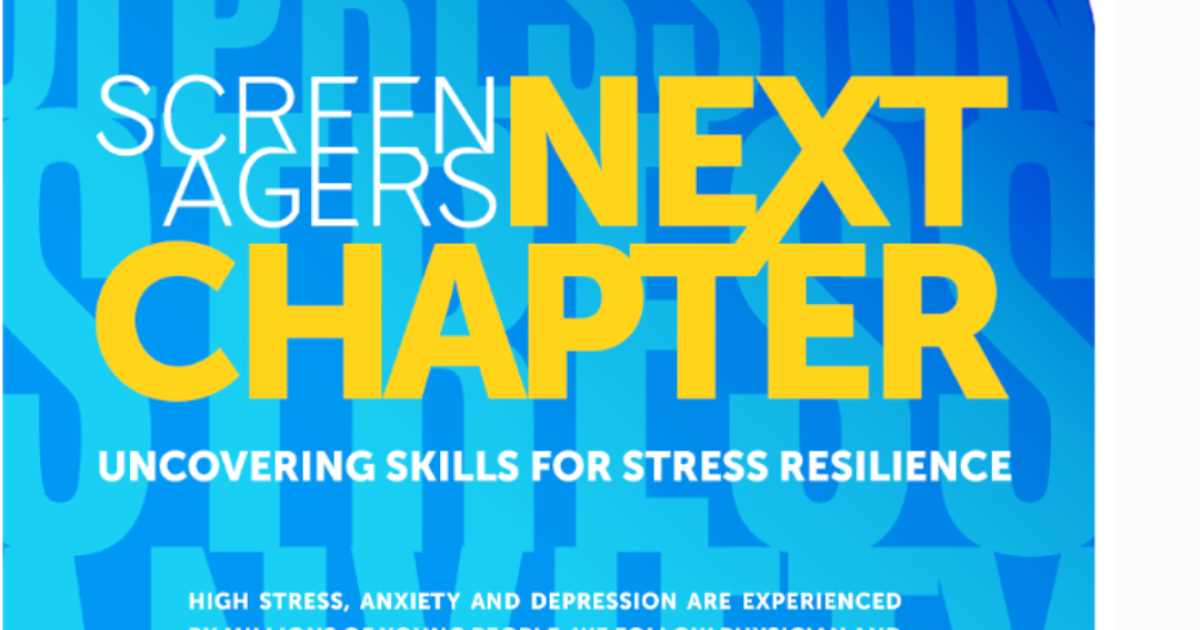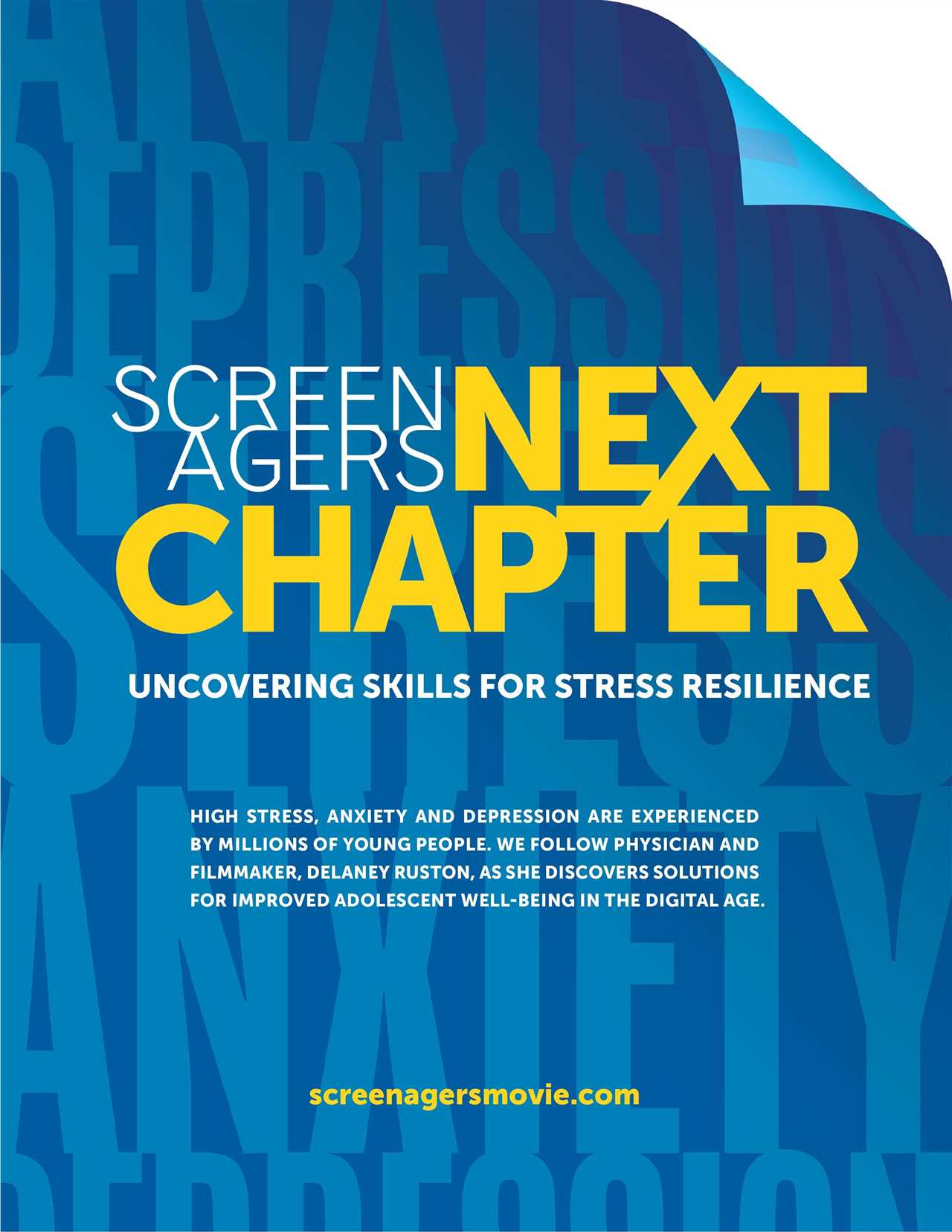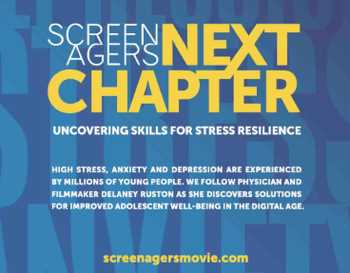
In the next chapter of the Screenagers documentary series, we delve deeper into the impact of technology on the younger generation. This time, we focus on uncovering the essential skills needed to build stress resilience in an increasingly digital world.
As technology continues to advance at an unprecedented pace, our children are facing new challenges and stressors that previous generations could not have imagined. From the constant pressure to stay connected and keep up with social media trends, to the ever-increasing demands of school and extracurricular activities, today’s youth are under immense stress.
But fear not, for the next chapter of Screenagers is here to shed light on the skills necessary to navigate this digital landscape with resilience. Through interviews with experts and real-life stories, we explore the strategies and techniques that can help young people build emotional strength and effectively manage stress.
From mindfulness and meditation practices to fostering healthy relationships and setting boundaries with technology, this chapter uncovers the skills that are essential for stress resilience in the next generation. Join us as we delve into the world of Screenagers and discover how we can equip our children with the tools they need to thrive in the face of adversity.
Chapter 1: Understanding the Impact of Screen Time on Stress Levels
In the first chapter of “Screenagers Next Chapter: Uncovering Skills for Stress Resilience”, we delve into the crucial topic of understanding how screen time affects stress levels. With the constant advancements in technology, screenagers are the generation that has grown up surrounded by screens, and it is important to explore the impact this has on their mental well-being.
Screen time has become an integral part of our daily lives, with screens being used for communication, entertainment, and education. However, research has shown that excessive screen time can contribute to increased stress levels. This chapter aims to shed light on the relationship between screen time and stress, helping screenagers and their parents better understand the potential consequences.
By examining the latest studies and expert opinions, we aim to provide valuable insights into the effects of screen time on stress levels. We explore how excessive screen use can lead to information overload, constant digital distractions, and a lack of real-world connections, all of which can contribute to heightened stress levels.
Furthermore, we discuss the importance of setting screen time boundaries and finding a healthy balance between digital engagement and offline activities. By implementing strategies to manage screen time effectively, screenagers can develop the necessary skills for stress resilience.
This chapter serves as a foundation for the subsequent chapters in “Screenagers Next Chapter: Uncovering Skills for Stress Resilience”, as it sets the stage for understanding the impact of screen time on stress levels. By gaining a comprehensive understanding of this relationship, screenagers and their families can take proactive steps towards promoting a healthier and more balanced lifestyle.
The Rise of Screen Time in Today’s Society

However, the increasing reliance on screens has raised concerns about the impact it has on individuals, especially young people. Studies have shown that excessive screen time can lead to a range of negative effects, including decreased physical activity, poor sleep quality, and increased risk of mental health issues.
As the next chapter of the Screenagers series, “Uncovering Skills for Stress Resilience,” explores, it is crucial to develop skills to navigate the challenges that come with the use of screens. The constant exposure to screens can be overwhelming and stressful, and individuals need to learn how to manage their screen time effectively.
One important skill for stress resilience is setting boundaries and creating a healthy balance between screen time and other activities. This includes allocating specific times for screen use, such as work or study hours, and setting aside time for physical activity, social interaction, and relaxation.
Another essential skill is practicing digital mindfulness. This involves being aware of one’s screen use and its impact on overall well-being. It includes taking regular breaks from screens, engaging in activities that do not involve screens, and being mindful of the content consumed online.
Furthermore, it is crucial to develop critical thinking skills to navigate the vast amount of information available on screens. This includes being able to evaluate the credibility and reliability of sources, fact-checking information, and avoiding falling into the trap of misinformation and fake news.
In conclusion, the rise of screen time in today’s society has brought about both opportunities and challenges. While screens provide access to a wealth of information and resources, they also pose risks to our physical and mental well-being. By developing skills for stress resilience, such as setting boundaries, practicing digital mindfulness, and cultivating critical thinking, individuals can navigate the digital world effectively and maintain a healthy balance in their screen usage.
The Link Between Screen Time and Stress

As we enter the next chapter of Screenagers, it is important to uncover the skills needed for stress resilience. One area that has been found to have a significant impact on stress levels is screen time.
Research has shown that excessive screen time can lead to increased stress and anxiety. The constant exposure to social media, news updates, and virtual interactions can overload our brains and contribute to feelings of overwhelm and burnout.
Furthermore, screen time often replaces more beneficial activities such as exercise, face-to-face socializing, and relaxation techniques. These activities are important for building resilience and managing stress effectively.
It is crucial for individuals, especially young people, to be mindful of their screen time and make conscious efforts to limit it. Setting boundaries and creating screen-free zones can help reduce stress levels and improve overall well-being.
In addition, developing skills for stress resilience, such as mindfulness, time management, and self-care, can also help mitigate the negative effects of screen time. By prioritizing these skills and finding a balance between technology use and other activities, individuals can better manage their stress levels and build resilience for the challenges of the digital age.
The Importance of Recognizing the Signs of Stress in Screenagers
As we enter the next chapter of the Screenagers series, uncovering skills for stress resilience becomes crucial. In today’s digital age, screenagers, or teenagers who spend significant time on screens, are more susceptible to stress than ever before. It is essential for parents, educators, and society as a whole to recognize the signs of stress in screenagers and take appropriate action.
Stress can manifest in various ways in screenagers. Some common signs include increased irritability, difficulty concentrating, changes in sleep patterns, and withdrawal from social activities. These signs may be subtle or easily overlooked, but they should not be ignored. Recognizing these signs is the first step in helping screenagers build resilience and develop healthy coping mechanisms.
By acknowledging and addressing stress in screenagers, we can provide them with the support they need to navigate the challenges of the digital world. It is important to create an open and non-judgmental environment where screenagers feel comfortable discussing their stressors. Encouraging them to express their emotions and providing them with tools and resources to manage stress can make a significant difference in their well-being.
Furthermore, recognizing the signs of stress in screenagers can help prevent more severe mental health issues from developing. Chronic stress can lead to anxiety, depression, and other mental health disorders if left untreated. By intervening early and providing appropriate support, we can help screenagers develop resilience and build a strong foundation for their future well-being.
Overall, the importance of recognizing the signs of stress in screenagers cannot be overstated. By addressing stress and promoting stress resilience skills, we can empower screenagers to navigate the digital world with confidence and maintain their mental and emotional well-being.
Chapter 2: Building Resilience Skills for Screenagers

In the next chapter of “Screenagers Next Chapter: Uncovering Skills for Stress Resilience,” we dive deeper into the importance of building resilience skills for screenagers. With the increasing prevalence of screens in our daily lives, it is crucial for young people to develop the necessary skills to navigate the stress and challenges that come with it.
Resilience is the ability to bounce back from setbacks and adapt to new situations. It is a skill that can be learned and developed over time. In this chapter, we explore various strategies and techniques that can help screenagers build resilience and effectively manage stress.
One of the key skills for stress resilience is self-awareness. Screenagers need to understand their own emotions, thoughts, and behaviors in order to effectively cope with stress. Through introspection and reflection, they can identify triggers and develop strategies to manage them.
Another important skill is problem-solving. Screenagers need to learn how to analyze and solve problems effectively. This involves breaking down complex issues into smaller, manageable tasks, and coming up with creative solutions. By developing problem-solving skills, screenagers can approach challenges with a positive mindset and find solutions that work for them.
Additionally, building a support network is essential for stress resilience. Screenagers should cultivate relationships with friends, family, and mentors who can provide guidance and support during difficult times. Having a strong support system can help screenagers feel understood and validated, reducing the impact of stress.
Lastly, practicing self-care is crucial for building resilience. Screenagers need to prioritize their physical and mental well-being by engaging in activities that promote relaxation and stress reduction. This can include exercise, mindfulness practices, hobbies, and spending time in nature.
In conclusion, Chapter 2 of “Screenagers Next Chapter: Uncovering Skills for Stress Resilience” focuses on the importance of building resilience skills for screenagers. By developing self-awareness, problem-solving skills, building a support network, and practicing self-care, screenagers can effectively navigate the challenges of screen time and build resilience to stress.
Developing Emotional Intelligence to Manage Stress

In the next chapter of Screenagers, the focus is on uncovering skills for stress resilience. One key skill that can greatly contribute to managing stress is developing emotional intelligence.
Emotional intelligence refers to the ability to recognize, understand, and manage our own emotions, as well as the emotions of others. By developing emotional intelligence, individuals can better navigate stressful situations, build strong relationships, and make more informed decisions.
There are several components of emotional intelligence that can be developed to effectively manage stress. These include:
| Self-awareness | Recognizing and understanding our own emotions, triggers, and stress responses. |
| Self-regulation | Managing and controlling our own emotions, thoughts, and behaviors in stressful situations. |
| Empathy | Understanding and sharing the emotions of others, which can help in building supportive relationships. |
| Effective communication | Expressing emotions and thoughts in a clear and respectful manner, while also actively listening to others. |
| Problem-solving | Using emotional intelligence to analyze and find solutions to stressful situations. |
Developing emotional intelligence takes time and practice. It involves self-reflection, self-awareness, and a willingness to learn and grow. By honing these skills, individuals can become more resilient in the face of stress, better handle challenging situations, and improve their overall well-being.
Screenagers Next Chapter provides valuable insights and strategies for developing emotional intelligence to manage stress effectively. By incorporating these skills into our lives, we can navigate the challenges of the digital age with greater ease and resilience.
Practicing Mindfulness and Meditation Techniques

In the next chapter of Screenagers, the focus is on uncovering skills for stress resilience. One powerful tool for building resilience is practicing mindfulness and meditation techniques.
Mindfulness involves paying attention to the present moment without judgment. By practicing mindfulness, individuals can become more aware of their thoughts, emotions, and bodily sensations. This increased awareness can help them better understand and manage stress.
One way to practice mindfulness is through meditation. Meditation involves focusing the mind and eliminating the stream of thoughts that often occupies our attention. By quieting the mind and focusing on the present moment, individuals can experience a sense of calm and clarity.
There are different techniques for practicing mindfulness and meditation. One common technique is to focus on the breath. By paying attention to the sensation of the breath entering and leaving the body, individuals can anchor their attention in the present moment.
Another technique is body scan meditation, where individuals systematically bring their attention to different parts of the body, noticing any sensations or tension. This practice can help individuals become more aware of their bodies and release any physical stress or tension.
Walking meditation is another technique that involves focusing on the sensations of walking. By bringing attention to each step, individuals can cultivate a sense of mindfulness and grounding in the present moment.
Practicing mindfulness and meditation techniques can be beneficial for stress resilience. By regularly engaging in these practices, individuals can develop a greater sense of self-awareness, emotional regulation, and the ability to cope with stress more effectively.
- Pay attention to the present moment without judgment
- Focus the mind and eliminate thoughts
- Anchor attention in the present moment through the breath
- Systematically bring attention to different parts of the body
- Focus on the sensations of walking

I am Patrina de Silva, a psychologist and mental health blogger in Sri Lanka. After obtaining psychology degrees from the University of Colombo and Monash University, I returned home to work as a counselor while also starting the popular blog “Pressy but Happy” to provide advice on psychological issues. Over the past decade, my empathetic articles have made my blog a leading mental health resource in the country. In addition to writing, I maintain a private therapy practice, frequently volunteer counseling time, and conduct seminars, driven by my passion for destigmatizing mental illness and educating the public on the mind-body connection. I strive to be an influential voice in my field through my compassionate approach.
